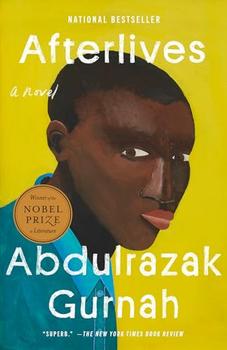Summary | Excerpt | Reviews | Beyond the Book | Readalikes | Genres & Themes | Author Bio

A Novel
by Abdulrazak Gurnah
He was just a clerk, entering figures in a ledger and keeping records up to date. That was all the work they allowed him to do. He did not think they fully trusted him with their affairs but that was the way with money and business. The brothers Hashim and Gulab were moneylenders, which as they explained to Khalifa is what all bankers really are. Unlike the big banks, though, they did not have customers with private accounts. The brothers were close in age and looked very alike: short and solidly built, with easily smiling faces, wide cheekbones and carefully clipped mustaches. A small number of people, all Gujarati businessmen and financiers, deposited their surplus money with them and they lent it out at interest to local merchants and traders. Every year on the Prophet's birthday they held a reading of the maulid in the garden of their mansion and distributed food to all who came.
Khalifa had been with the brothers for ten years when Amur Biashara approached him with a proposition. He already knew Amur Biashara because the merchant had dealings with the bank. On this occasion, Khalifa helped him out with some information that the owners did not know he knew, details about commission and interest that helped the merchant strike a better deal. Amur Biashara paid him for the information. He bribed him. It was only a small bribe, and the advantage Amur Biashara gained from it was modest, but the merchant had a cutthroat reputation to maintain and, in any case, he could not resist anything underhand. For Khalifa, the modesty of the bribe allowed him to suppress any feeling of guilt at betraying his employers. He told himself he was acquiring experience in business, which was also about knowing its crooked ways.
Some months after Khalifa made his little arrangement with Amur Biashara, the banker brothers decided to transfer their business to Mombasa. This was as the railway from Mombasa to Kisumu was under construction and the colonial policy of encouraging Europeans to settle in British East Africa, as they called it at the time, was approved and launched. The banker brothers expected better opportunities to be opening up there, and they were not the only ones among the Indian merchants and craftsmen. At the same time, Amur Biashara was expanding his business and he employed Khalifa as a clerk because he himself could not write in roman alphabet and Khalifa could. The merchant thought this knowledge could be useful to him.
The Germans had by then subdued all revolt in their Deutsch-Ostafrika, or so they thought. They had taken care of al Bushiri and the protests and resistance of the caravan traders on the coast. They had suppressed that rebellion after a struggle, captured al Bushiri and hanged him in 1889. The schutztruppe, the army of African mercenaries known as askari under the direction of Colonel Wissmann and his German officers, was at that time made up of disbanded Nubi soldiers who had served the British against the Mahdi in Sudan and Shangaan "Zulu" recruits from southern Portuguese East Africa. The German administration made a public spectacle of al Bushiri's hanging, as they were to do with the many other executions they would carry out in the coming years. As a fitting token of their mission to bring order and civilization to these parts, they turned the fortress in Bagamoyo, which was one of al Bushiri's strongholds, into a German command post. Bagamoyo was also the terminus of the old caravan trade and the busiest port on that stretch of the coast. Winning and holding it was an important demonstration of German control of their colony.
There was still much for them to do, though, and as they moved inland they encountered many other peoples who were reluctant to become German subjects: the Wanyamwezi, Wachagga, Wameru, and most troublesome of all the Wahehe in the south. They finally subdued the Wahehe after eight years of war, starving and crushing and burning out their resistance. In their triumph, the Germans cut off the head of the Wahehe leader Mkwawa and sent it to Germany as a trophy. The schutztruppe askari, aided by local recruits from among the defeated people, were by then a highly experienced force of destructive power. They were proud of their reputation for viciousness, and their officers and the administrators of Deutsch-Ostafrika loved them to be just like that. They did not know about the Maji Maji uprising, which was about to erupt in the south and west as Khalifa went to work for Amur Biashara, and which was to turn into the worst rebellion of all and elicit even greater ferocity from the Germans and their askari army.
Excerpted from Afterlives by Abdulrazak Gurnah. Copyright © 2022 by Abdulrazak Gurnah. Excerpted by permission of Riverhead Books. All rights reserved. No part of this excerpt may be reproduced or reprinted without permission in writing from the publisher.
Your guide toexceptional books
BookBrowse seeks out and recommends the best in contemporary fiction and nonfiction—books that not only engage and entertain but also deepen our understanding of ourselves and the world around us.